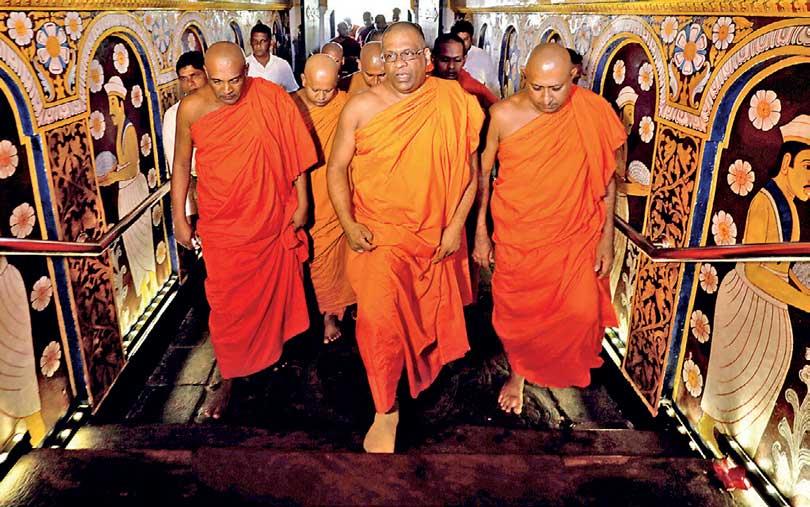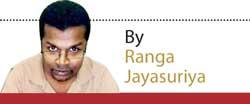Reply To:
Name - Reply Comment

 The Bodu Bala Sena, a Sinhala Buddhist nationalist group blamed on propagating Islamophobia converged in a large gathering in Kandy on Sunday. Around a thousand Buddhist monks and a large number of devotees answered the call by BBS chieftain Ven. Galaboda Aththe Gnanasara Thera, who is mobilizing grassroots of Sinhala Buddhist zealotry since his release from prison on a presidential pardon. Fearing the worst, local Muslims shut their shops. However, nothing untoward - except a few utterance of Islamophobia by the speakers at the rally- happened.
The Bodu Bala Sena, a Sinhala Buddhist nationalist group blamed on propagating Islamophobia converged in a large gathering in Kandy on Sunday. Around a thousand Buddhist monks and a large number of devotees answered the call by BBS chieftain Ven. Galaboda Aththe Gnanasara Thera, who is mobilizing grassroots of Sinhala Buddhist zealotry since his release from prison on a presidential pardon. Fearing the worst, local Muslims shut their shops. However, nothing untoward - except a few utterance of Islamophobia by the speakers at the rally- happened.
These days, peddlers of Sinhala Buddhist nationalism are competing against each other, than they confront the real and perceived Islamic extremist threat. There are several competing nationalist ventures currently underway in order to capitalize on the post- Easter attack mass sentiments. Athuraliye Rathana Thera held a death fast demanding the resignation of the Muslim politicians who were accused of involvement with the Islamic extremism. He successfully won his demands, and also stole limelight and a captive nationalist audience from the Gnanasara There, who in public criticized Rathana Thera. Minister Champika Ranawaka of the Jathika Hela Urumaya has also launched a competing campaign against Islamic extremism. So are the acolytes of Gotabaya Rajapaksa, who is recuperating in Singapore after an open heart surgery.
However, the BBS rally appeared to be more ambitious. Galaboda Aththe Gnanasara Thera called on the attendees to elect a ‘Sinhala Buddhist parliament.’ He number-crunched that if the proposed campaign could command the support of 7000 temples, each of which could persuade 10,000 voters to vote for a common Sinhala Buddhist nationalist agenda, Sri Lanka could elect a ‘ Sinhala government.’
“If the country is to have a democratic parliament, the monks should own it,” he told the hordes of devotees attending the rally at the Bogambara ground. He is wrong. What he is referring to is not democracy, but theocracy. Funny enough, notwithstanding his opposition to political Islam, it is the Islamic world- such as theocracy of Iran and marriage of convenience between House of Saud and Wahhabi establishment in Saudi Arabia-where the clergy own the government. They have reigned over intolerant and monopolistic regimes that have suppressed fundamental rights of their own people and made the rest of the civilized world loath them.
Gnanasara Thera had not said whether his group would support a particular political party or form one of their own. If the latter is their choice, as the history has shown, Buddhist nationalist street power does not necessarily translate into parliament seats
The BBS’s latest campaign comes in the wake of a presidential election that is due before the end of this year and will be followed by a general election. Gnanasara Thera had not said whether his group would support a particular political party or form one of their own. If the latter is their choice, as the history has shown, Buddhist nationalist street power does not necessarily translate into parliament seats. Only exception was Jathika Hela Urumaya in the early 2000s, since then, its parliamentary representation has declined to three seats. Given the BBS’s chequered recent history, it is unlikely that the party would perform any better. Therefore the likely option would be that it would offer to support political candidates who would agree to a set of demands. In the parliamentary elections, especially in the South, election candidates would be beholden to this proposition. However, in the presidential election, an association with BBS would come at the expense of a large chunk of minority votes, and the two main presidential contenders would be less inclined to strike a deal with the BBS. ( Though one cannot be sure whether the prospective SLPP candidate Gotabaya Rajapaksa who is anyway loathed by minorities would opt to contest in a full blown majoritarian nationalist platform and reach out to the BBS).
There is a recent parallel to the BBS monks’ political horse- trading. Interestingly the protagonist is the Easter Sunday terrorist ringleader Mohammed Zahran, who during the previous parliamentary election offered his support and votes of his followers to parties and candidates that best adhered to the Wahhabi traditions of Islam. He implored that no songs be played in the stage, and male and female attendees be segregated. All the Muslim parties agreed. Then, four years later, Zahran and his acolytes blew up hotels and churches on Easter Sunday and Muslims are facing the brunt of populist backlash for extremism that their politicians and their societies once tolerated and fostered.
However, this does not necessarily mean to strike a similarity between Sinhala Buddhist nationalism and Salafism.
By design, Sinhala nationalism is not capable of extreme violence associated with Islamic extremism or nihilistic terrorism mastered by Tamil ethno-nationalism. Certain inherent characteristics condition its behaviour. Sinhala Buddhist nationalism is more likely to manifest in low level street thuggery, in contrast to the mass slaughter and suicide bombing its opponents would indulge in as a matter of religious or national duty.
However, Sinhala Buddhist nationalism and its street power have always been a distraction and an irritant. They have also helped reinforce common misconceptions actively promoted by self- interested parties, and are now playing into the hands of Zahran and his fellow terrorists, who wanted to mobilize Muslims by provoking a Sinhalese majority reaction.
Sinhala Buddhist nationalism is also irrational. It is emotionally driven. It draws inspiration from ancient times, and lacks substantial intellectual basis on an economic ideology that can integrate Sri Lanka to the global market or a political thought that can successfully navigate the vagaries of competing interests of diverse stakeholders in our society. Old- age wisdom is not a supplant to the absence of the above.
However, the essence of the Sinhala Buddhist nationalist reading of Sri Lanka’s problem is closer to reality. Sri Lanka has a problem with managing and regulating its ethnic diversity. Parochial Tamil nationalism and subsequent terrorism brought this country to its knees. Now, an imported variety of Wahhabi extremism is making inroads. Both these varieties are extremely dangerous and would resurface in all monstrosity whenever there are ideal conditions. Elsewhere, Evangelical Christian proselytisation is preying on the most vulnerable in the society. The full magnitude of its destabilising impact would only come to light when the disgruntled villagers take the law into their hand.
All these pernicious drivers should be confronted with, their conduct be regulated and monitored. However, that cannot be done by granting a free reign for Sinhala Buddhist nationalism. Because it is part of the problem and not the solution. It too should be cut to its right size, and put in its place.
Follow @RangaJayasuriya on Twitter